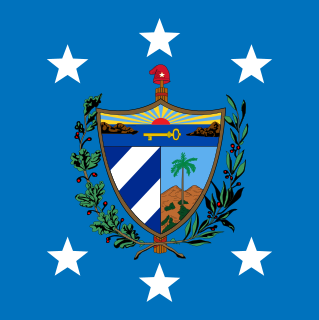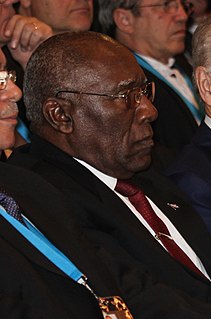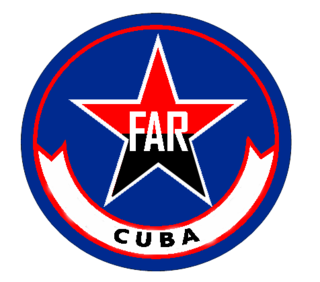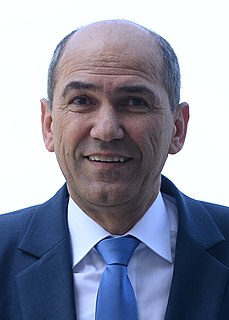Cuba has had a communist political system since 1959 based on the "one state – one party" principle. Cuba is constitutionally defined as a Marxist–Leninist socialist state guided by the political ideas of Karl Marx, one of the fathers of historical materialism, Friedrich Engels and Vladimir Lenin. The present Constitution also ascribes the role of the Communist Party of Cuba to be the "leading force of society and of the state" and as such has the capability of setting national policy. The most recent leader was Raúl Castro, who held the title of First Secretary of the Communist Party of Cuba. As of 2018 Miguel Díaz-Canel is now the president of Cuba.

The President of the Republic of Cuba, officially called President of the Council of State between 1976 and 2019, is the head of the Council of State of Cuba. The office in its current form was established under the Constitution of 2019. The president is the second most powerful position, after the First Secretary of the Communist Party of Cuba.
Open list describes any variant of party-list proportional representation where voters have at least some influence on the order in which a party's candidates are elected. This as opposed to closed list, which allows only active members, party officials, or consultants to determine the order of its candidates and gives the general voter no influence at all on the position of the candidates placed on the party list. Additionally, an open list system allows voters to select individuals rather than parties. Different systems give voter different amounts of influence. Voter's choice is usually called preference vote.

Elections in Cuba involve nomination of municipal candidates by voters in nomination assemblies, nomination of provincial and national candidates by candidacy commissions, voting by secret ballot, and recall elections. Cuba is a one-party state with the Communist Party of Cuba as the "leading force of society and of the state" under the national constitution, although elections are nominally non-partisan.
A parliamentary election to the National Assembly of People's Power was held in Cuba on 20 January 2008. According to the Cuban electoral system, one candidate was nominated for each of the 614 seats in the Assembly, and candidates were elected if they received at least 50% of the vote. The candidates are otherwise proposed by nominating assemblies, which comprise representatives of workers, youth, women, students and farmers as well as members of the Committees for the Defense of the Revolution, after initial mass meetings soliciting a first list of names. The final list of candidates is drawn up by the National Candidature Commission taking into account criteria such as candidates' merit, patriotism, ethical values and revolutionary history.

An indirect presidential election was held in Cuba on 24 February 2008, in which the National Assembly of People's Power elected a new President of Cuba and the members of the Council of State. The election followed the January 2008 parliamentary election. In the election, Raúl Castro, who had been Acting President since July 2006, was elected as President, succeeding his older brother, Fidel Castro.

Miguel Mario Díaz-Canel Bermúdez is a Cuban politician serving as the current President of Cuba. He was previously First Vice President from 2013 to 2018. He has been a member of the Politburo of the Communist Party of Cuba since 2003, and he served as Minister of Higher Education from 2009 to 2012; he was promoted to the post of Vice President of the Council of Ministers in 2012. A year later, on 24 February 2013, he was elected as First Vice President of the Council of State.

The First Secretary of the Central Committee of the Communist Party of Cuba is the highest office within the Communist Party of Cuba and is ranked first in the Politburo, the highest decision-making body in Cuba, which makes the office holder the most powerful person in Cuban government.

The Politburo of the Central Committee of the Communist Party of Cuba is the party's highest decision-making body in between sessions of the Central Committee. The party's First Secretary chairs the body's meetings.

Presidential elections were held in Venezuela on 20 May 2018, with incumbent Nicolás Maduro being re-elected for a second six-year term. Considered a snap election, the original electoral date was scheduled for December 2018 but was subsequently pulled ahead to 22 April before being pushed back to 20 May. Some analysts described the poll as a show election, with the elections having the lowest voter turnout in the country's democratic era.

Legislative elections were held in Angola on 23 August 2017, although voting was delayed until 26 August at 15 polling stations due to bad weather on election day. The top candidate of the winning party automatically becomes President after the election in accordance with the new 2010 Constitution. The ruling party MPLA headed by João Lourenço was widely expected to win. Preliminary results show that MPLA has won with a clear margin. The final results were released on 6 September 2017.
Events in the year 2017 in Cuba.
The following lists events that happened during 2013 in Cuba.
Events in the year 2018 in Cuba.

Parliamentary elections are scheduled to be held in Cuba in 2023 to elect members of the National Assembly of People's Power. They will be the first elections since 1976 that neither Fidel or Raúl Castro are involved.

Salvador Valdés Mesa is a Cuban politician and former trade union leader. He is the First Vice President of Cuba since April 2018 and is a member of the Political Bureau of the Communist Party of Cuba.

The Ministry of the Revolutionary Armed Forces of Cuba, also known as the Ministry of the FAR, is a Cuban military agency which is the executive body of the Cuban Revolutionary Armed Forces. The current Minister of the FAR is Corps General Leopoldo Cintra Frías.

Parliamentary elections will held in Slovenia no later than 5 June 2022













